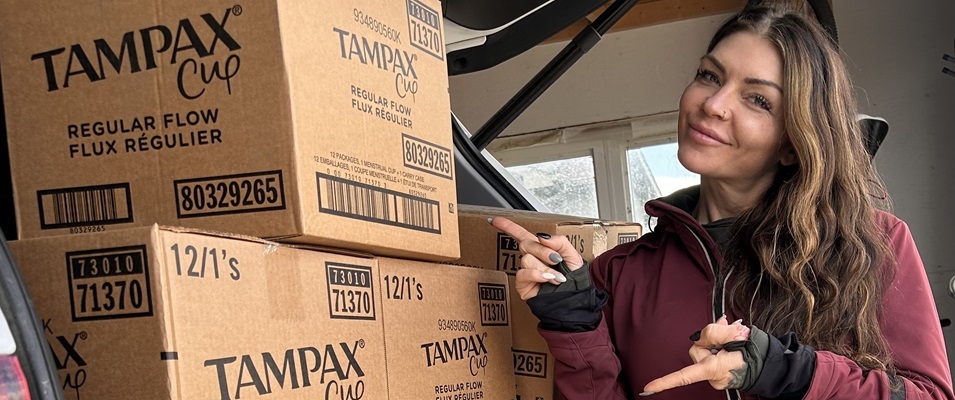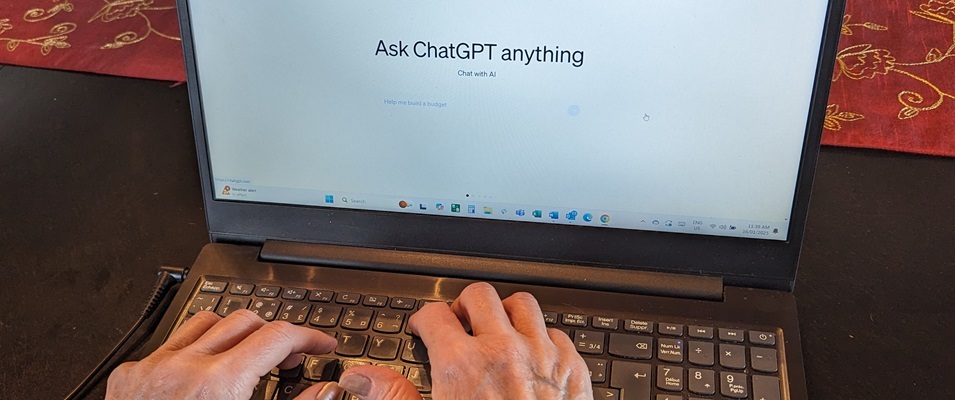
Every Thursday morning, without fail, they visit your street, whisk away your undesirables, and make your world a better place. Eastman Recycling Services (ERS) is a non-profit organization with a dual mission: to clean up the planet and support people with disabilities.
The organization got its start over 20 years ago as a way to provide alternative work options for those with intellectual disabilities. They’ve grown from a small sorting operation in the backyard of Kindale Occupation Centre to a large material recycling facility in Steinbach’s industrial park.
On a mission to find out where our recycling goes when it leaves our blue bins, I paid a visit to the facility and received the guided tour by EnVision’s Vocational Services Coordinator, Darryl Marsch. I was amazed by the magnitude of what I saw.
The sorting station is the first stop for our recyclables. Trucks enter here and dump their massive loads into a pit, feeding a conveyor belt which transfers materials to a second floor sorting line. A group of 15 sorters takes their positions on either side of the conveyor, each one responsible for a different item—glass, aluminum, paper, cardboard, and a variety of plastics.
Materials are then dropped into bunkers for paper and cardboard, and closed hoppers for cans and plastics. Once separated, they’re moved along another conveyor and fed into a baler, creating mammoth bales of tightly wrapped saleable materials. The bales are stacked several levels high in an adjoining warehouse like colourful skyscrapers. From here, they’re shipped out and repurposed into new products.
“The thing that makes anything recyclable is if you have an end use for it and it can be converted into something else,” says Marsch.
The demand for new kinds of recyclable materials is growing. Larger, for-profit recycling companies like Emterra in Winnipeg have access to international markets due to volume, while ERS is still a relatively small operation by comparison. Still, markets for much of our recyclable materials abound in North America.
Old aluminum cans become new aluminum cans at Alcoa in Tennessee. Shaw Clear Path Recycling turns pop and water bottles into carpets in North Carolina. Steel cans head to Winnipeg’s General Scrap where they are shredded and smelted into new steel products. Paper and cardboard is trucked to Northstar Fibre in Morden, Manitoba, where it is repulped or turned into fiberfill insulation.
Glass is put to use in landfills close to home. Marsch explains that local landfills crush glass products and use it as part of their gravel base to create roads through their sites.
ERS’s access to buyers was recently broadened when they began working with a materials broker. “[Our broker’s] interest is to buy as much materials from us as he can and resell it because that is his primary business,” says Marsch. “So he’s actively looking for markets for anything we can’t get rid of.”
Marsch is also an active member of the Manitoba Association of Regional Recyclers. Part of the group’s mandate is to be constantly on the lookout for new and different recycling initiatives.
“There is a lot of material that is recyclable somewhere in the world, but not here,” adds Marsch. He cites Styrofoam and plastic bags, two of the most widely used and disposed of items. Even plastic bags that claim to be recyclable end up in landfills due to the lack of feasible buyers.
So the question begs asking: what can we recycle? The answer is, most things. Paper, cardboard, milk cartons, juice boxes, cans, glass, and most plastics (#1, #2, #4, #5, and #7). If you’re unsure of your plastic container, check the bottom for the number displayed inside the recycling symbol.
As for paper, Marsch says that if you can rip it, it’s recyclable. That includes glossy catalogue covers. In the case of books with non-tearable covers, Marsch recommends removing the pages and recycling them separately.
But what about items with food residue? Marsch says that this doesn’t affect the recyclability of a container. Cheese on a pizza box or soup on a can gets dealt with somewhere along the process. Some effort by homeowners to remove food does make the sorting process more effective, but it isn’t essential.
In terms of food packaging, some of it is recyclable and some of it isn’t. Foil or wax-coated inserts in cereal, chip, and cookie boxes aren’t recyclable even though the box is. Tissue boxes where plastic is layered into the paper fiber are fully recyclable, as recyclers have a separation process for these items.
Marsch would like to encourage people not to put materials inside other materials, which creates unnecessary work for sorters. For example, putting empty pop cans back in the cardboard box they came in.
But what does recycling cost our community? According to Niverville Mayor Myron Dyck, almost nothing. All of our recyclables are weighed when they arrive at ERS, and they submit a ticket to town council. Council forwards this weigh-ticket to Multi-Material Stewardship Manitoba (MMSM), a non-profit company that charges levies on recyclable materials. MMSM reimburses the community based on the weight of materials recycled.
In the end, there are so many reasons to recycle. From reducing our environmental footprint and encouraging companies to create responsible packaging to creating jobs for people with intellectual disabilities, your participation does it all.
With the recent introduction of larger garbage bins in Niverville, we may be tempted to fill them up and recycle less. Let’s not forget how our efforts can change the world now and into the future. Let’s do our part.



















